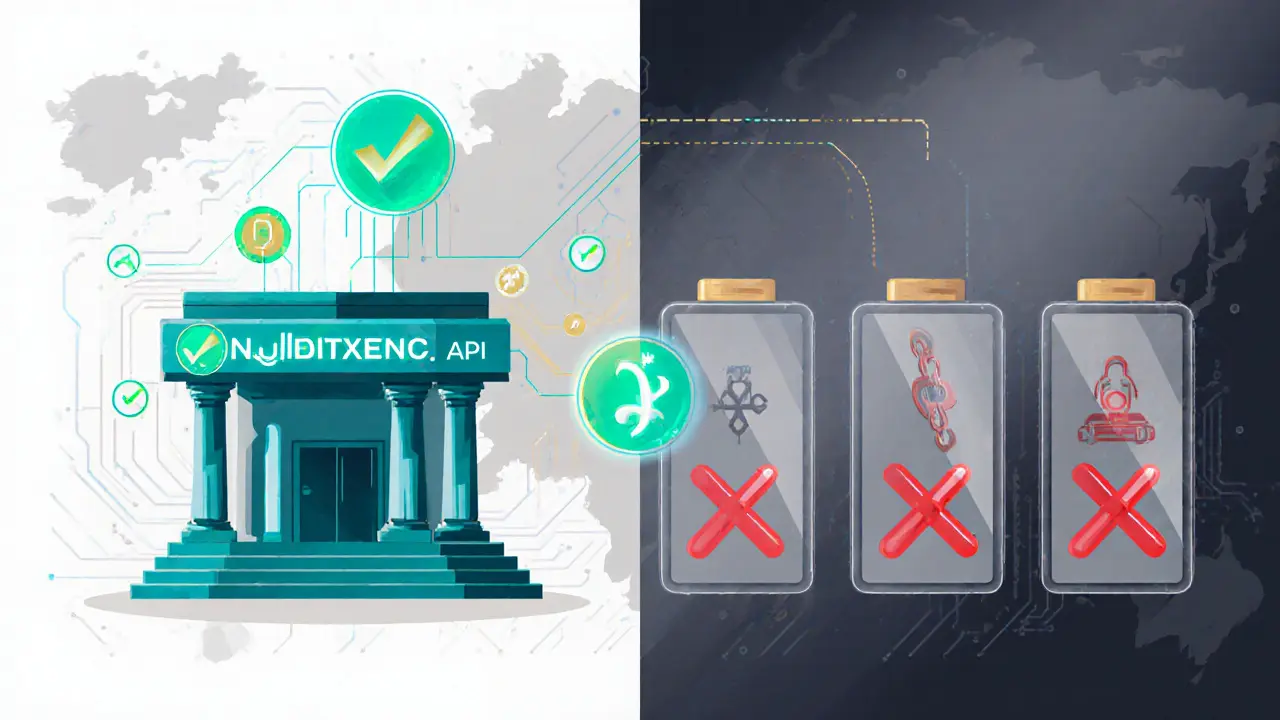Iran Crypto Exchange Status Checker
Domestic Exchanges
- Nobitex Operational via API
- Wallex Shut Down
- Coinex Iran Limited Operations
- Rialto Restricted
Foreign Exchanges
- Tether (USDT) Frozen
- Bittrex Blocked
- Binance Restricted
- Coinbase Blocked
Trying to trade crypto from Iran feels like navigating a maze that constantly changes shape. One moment a platform is accessible, the next it’s blocked by the government or a foreign regulator. In 2025 the landscape isn’t defined by a neat list of prohibited names; it’s a blend of domestic rules, international sanctions, and real‑time compliance actions. Below you’ll find a plain‑language breakdown of which exchanges you can’t use, why they’re off‑limits, and how Iranian traders are coping.
TL;DR - Quick Takeaways
- Iran’s Central Bank halted all crypto‑to‑rial conversions in December2024 and now only allows exchanges that connect through its government‑run API.
- Foreign platforms such as Tether (the USDT stablecoin issuer) have frozen thousands of Iranian addresses, effectively banning USDT transactions.
- Major U.S. exchanges like Bittrex (a former crypto exchange now under bankruptcy proceedings) freeze Iranian accounts to stay compliant with OFAC.
- Domestic giant Nobitex (Iran’s largest cryptocurrency exchange) remains operational but is under constant scrutiny; many of its withdrawal pathways are blocked by foreign partners.
- Iranians increasingly route trades through Turkey or use decentralized networks like Polygon‑DAI to dodge restrictions.
Why Iran’s Crypto Rules Matter
Understanding the bans starts with the two pillars that shape them: the Iranian government’s own controls and the United States’ sanctions regime. In late2024 the Central Bank of Iran (CBI) issued a sweeping decree that stopped every website‑based crypto‑to‑rial payment. The move was meant to curb capital flight and give Tehran a clearer view of who’s moving money in and out of the country.
Rather than opening the market, the CBI introduced a government‑run API that only a handful of approved exchanges can use. Those platforms must share full user data with the bank, effectively turning crypto trading into a monitored service. Any exchange that refuses to plug into this API is blocked from operating inside Iran.
On the other side, the U.S. Treasury’s Office of Foreign Assets Control (OFAC) has been expanding its reach into the crypto space. Since 2023 OFAC designates not just banks but also crypto addresses, wallets, and service providers. When an exchange is placed on an OFAC list, it must freeze all accounts linked to Iran, or risk losing access to the U.S. financial system.
Domestic Exchanges That Face Bans or Restrictions
Below are the Iranian platforms most directly impacted by the CBI’s API rule and related government actions.
- Nobitex - Iran’s flagship exchange. It still processes trades, but only when it routes fiat through the CBI‑approved API. Direct withdrawals to foreign wallets are often blocked because partner exchanges abroad are under U.S. sanctions.
- Wallex - A smaller domestic platform that tried to operate without the API and was shut down in March2025. Users reported sudden account freezes and loss of access to their balances.
- Coinex Iran - The Iranian branch of the global Coinex network. After the December2024 decree, it was forced to suspend all crypto‑to‑rial conversions and now only offers peer‑to‑peer swaps that stay within Iranian fiat.
- Rialto - A niche exchange focused on stablecoin trading. The September2025 directive limiting stablecoin purchases to $5,000 per year effectively crippled its business model.
Foreign Exchanges Blocked by Sanctions
Even if an Iranian trader can bypass the CBI’s API, they still confront foreign platforms that refuse Iranian users to stay OFAC‑compliant.
- Tether (USDT) - In July2025 Tether froze 42 Iranian‑linked addresses, many of which were routing funds through Nobitex. The freeze was the largest ever for a single issuer and signaled that stablecoin providers are actively policing Iranian activity.
- Bittrex - After a U.S. Treasury sanction in early2025, Bittrex locked all accounts with Iranian IP addresses and any wallet linked to Iranian nationals. A high‑profile lawsuit by an Iranian investor was dismissed because the exchange’s Terms of Service gave it the right to suspend accounts for legal compliance.
- Binance - While Binance never publicly listed Iran as a banned jurisdiction, its compliance team started rejecting KYC documents that listed Iranian residency after the OFAC designations in late2024. This effectively bars new Iranian users from onboarding.
- Coinbase - Coinbase’s policy now explicitly blocks accounts that are linked to countries under U.S. sanctions, which includes Iran. Existing accounts were subject to a “review and close” process in early2025.
- Kraken - Similar to Coinbase, Kraken stopped accepting Iranian users for any fiat deposit or withdrawal in 2025, leaving only crypto‑only transfers (which are still risky because of downstream address monitoring).

How Iranian Traders Are Getting Around the Blockade
When direct access is cut off, people get creative. Here are the most common work‑arounds observed in 2025:
- Cross‑border hubs - Turkey has become the go‑to gateway. Residents set up accounts with Turkish exchanges (e.g., BTCTurk, Paribu) that accept Iranian phone numbers and then move crypto to global platforms.
- Decentralized finance (DeFi) - Users swap USDT for DAI on the Polygon network via decentralized apps (dApps) that don’t require KYC. This approach sidesteps centralized freezes but carries higher gas fees and smart‑contract risk.
- Peer‑to‑peer (P2P) markets - Platforms like LocalBitcoins (still partially functional) and Iranian‑run P2P forums allow direct fiat‑crypto trades, often using cash‑in‑hand methods to avoid digital traces.
- VPN & proxy services - While the CBI can block IP ranges, many traders use VPNs to appear as if they’re browsing from Europe, then access foreign exchanges that unfortunately still enforce OFAC rules on the backend.
- Stablecoin diversification - After the Tether freeze, a wave of users moved to DAI, USDC, and native blockchain tokens (e.g., Binance‑Chain BUSD) to keep assets liquid.
Comparison of Exchanges Affected in 2025
| Exchange | Type | Ban Reason | Status (Jan2025‑Oct2025) |
|---|---|---|---|
| Nobitex | Domestic | Requires CBI API compliance; foreign partner freezes | Operational via API only |
| Wallex | Domestic | Refused API, closed by CBI | Shut down March2025 |
| Tether (USDT) | Stablecoin Issuer | OFAC address freeze | Frozen 42 Iranian wallets July2025 |
| Bittrex | Foreign Exchange | US Treasury sanctions | Accounts frozen, no new sign‑ups |
| Binance | Foreign Exchange | KYC rejection under OFAC | New Iranian users blocked |
| Coinbase | Foreign Exchange | Sanctions compliance policy | Existing accounts reviewed, new sign‑ups denied |
What the Future Holds for Iranian Crypto Users
Two major forces will shape the next wave of restrictions:
- Domestic policy tightening - The Iranian parliament is expected to pass stricter capital‑gains tax rules on crypto by early2026, making every trade reportable. Combined with the CBI’s API‑only model, this could push more users toward offshore solutions.
- International sanctions escalation - The U.S. Treasury indicated a plan to broaden OFAC designations to include more blockchain infrastructure providers. If that happens, even DeFi gateways that rely on centralized bridges could see their services cut off for Iranian addresses.
For individuals, the safest bet remains a diversified approach: keep a small amount in a locally approved exchange for everyday needs, hold the bulk in privacy‑preserving stablecoins on a layer‑2 network, and maintain a backup wallet in a jurisdiction with friendly crypto policies, such as Turkey or the UAE.
Key Points to Remember
- The Iranian government does not publish a public “banned list”; instead, it enforces technical barriers via the central bank API.
- U.S. sanctions are the main reason foreign platforms freeze Iranian users - compliance is non‑negotiable for them.
- Work‑arounds exist but come with higher risk (legal, technical, and financial).
- Staying updated on both Iranian regulatory announcements and OFAC designations is essential for anyone actively trading.
Frequently Asked Questions
Which Iranian exchange can I still use in 2025?
Nobitex remains the only domestic platform that operates legally, but only if it connects through the Central Bank’s API and shares full user data with the bank. All other local exchanges have either been shut down or severely limited.
Can I trade USDT from Iran?
Not directly. Tether froze dozens of Iranian wallets in July2025, and most major exchanges block USDT transactions linked to Iran. Users are moving to DAI on Polygon or other stablecoins that are not under the same freeze.
Is using a VPN legal for accessing foreign crypto sites?
Using a VPN to mask your IP is not illegal under Iranian law, but if you end up violating sanctions by moving funds out of the country, you could face severe penalties. Proceed with extreme caution.
What are the tax obligations for crypto traders in Iran?
The August2025 Taxation of Speculation and Profiteering Law treats crypto gains like any other speculative asset. You must declare capital gains and pay the applicable tax rate, currently set at 25% for individuals.
Is Turkey a safe alternative for Iranian crypto users?
Turkey offers a relatively open crypto market and easy residency options, making it a popular hub for Iran‑based traders. However, Turkish authorities have also been pressured by the U.S. to monitor sanction‑evasion flows, so it’s not a completely risk‑free corridor.


Author
Ronan Caverly
I'm a blockchain analyst and market strategist bridging crypto and equities. I research protocols, decode tokenomics, and track exchange flows to spot risk and opportunity. I invest privately and advise fintech teams on go-to-market and compliance-aware growth. I also publish weekly insights to help retail and funds navigate digital asset cycles.